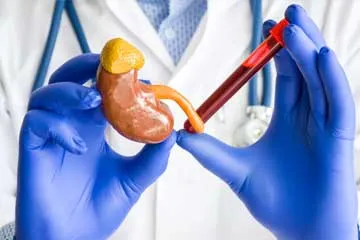
Creatinine is a chemical waste product formed when muscles perform their routine tasks, including energy production. Normally, your kidneys filter out creatinine and eliminate it through urine. But when the levels rise beyond the normal range (0.7 to 1.3 mg/dL for men and 0.6 to 1.1 mg/dL for women), it can be a warning sign of kidney trouble. Managing elevated creatinine levels is essential, as it indicates impaired kidney function, which, if left unchecked, can lead to chronic kidney disease (CKD) or kidney failure. Thankfully, Ayurvedic treatment for high creatinine offers a holistic way to address this problem, emphasizing natural healing and improving kidney health without harsh side effects.
Creatinine is more than just a waste product—it reflects how well your kidneys are functioning. Every time your muscles contract, they produce creatinine as part of energy metabolism. If your kidneys are working efficiently, they flush it out without issue. However, elevated creatinine levels might indicate an underlying kidney disorder, dehydration, or even excessive protein intake.
In most conventional treatments, dialysis or medications are the go-to strategies to manage elevated creatinine levels. But these approaches may not address the root cause and could introduce new complications. On the other hand, Ayurvedic treatment for muscular by products focuses on balancing the body's doshas, strengthening the kidneys, and using natural herbs to cleanse and rejuvenate the system—making it a sustainable option for long-term health.
When creatinine levels go up, your body may send out several warning signs:
Some common factors leading to elevated creatinine levels include:
In Ayurveda, high creatinine is viewed as an imbalance in the body's doshas, particularly Kapha and Pitta dosha, which leads to reduced kidney function. Rather than suppressing symptoms, Ayurvedic treatment for kidney creatinine aims to address the root causes by:
Let’s dive deeper into some effective Ayurvedic herbs and practices that play a crucial role in bringing creatinine levels back to normal.
1. Punarnava: This powerful herb is known for its diuretic properties, which help in flushing out toxins and excess creatinine from the body. It reduces swelling and improves kidney filtration.
2. Gokshura: Gokshura acts as a rejuvenator for the urinary system, promoting better kidney function. It also helps in managing urinary tract infections, which can worsen kidney issues.
3.Varuna: Varuna supports kidney health by clearing blockages in the urinary system and promoting healthy urine flow. It is effective in managing kidney stones and inflammation.
4. Shatavari: Shatavari helps in balancing the Pitta dosha, reducing heat in the body, and supporting kidney tissues. It also has antioxidant properties that protect the kidneys from further damage.
5. Chandan: Known for its cooling properties, Chandan helps in reducing inflammation and balancing Pitta dosha, which can be elevated in individuals with kidney problems.
6. Triphala: This traditional Ayurvedic blend of three fruits—Amla, Haritaki, and Bibhitaki—works as a natural detoxifier, helping cleanse the digestive tract and kidneys.
Besides herbal remedies, Ayurveda emphasizes a holistic lifestyle to promote kidney health. Here are some essential practices:
Proper hydration helps the kidneys filter out waste effectively. Sipping warm water throughout the day can aid detoxification without overwhelming the kidneys.
While protein is important, excess of it may strain the renals. Ayurveda recommends a diet rich in fruits, vegetables, and whole grains while moderating protein-rich foods like red meat and dairy.
Gentle yoga poses like Bhujangasana (cobra pose) and Balasana (child’s pose) promote blood circulation to the kidneys. Pranayama (breathing exercises) like Nadi Shodhana (alternate nostril breathing) help reduce stress, which can affect kidney health.
Processed foods contain harmful additives that stress the kidneys. Ayurveda encourages a natural, home-cooked diet with herbs and spices to aid digestion and detoxification.
Panchakarma, an Ayurvedic detoxification therapy, can be beneficial for individuals with high creatinine. It helps in cleansing the body and balancing the doshas, promoting better kidney function.
Ayurveda offers hope for individuals struggling with high creatinine levels. While complete reversal depends on the severity of the condition, Ayurvedic treatment for high creatinine focuses on improving kidney health step-by-step. By enhancing the body's natural healing process, Ayurveda can stabilize creatinine levels over time and reduce the dependency on invasive procedures like dialysis.
It’s essential to consult an Ayurvedic practitioner before starting any herbal regimen to ensure that the treatment aligns with your body constitution and condition. With the right approach, Ayurvedic methods can significantly enhance the quality of life for kidney patients.
Numerous people have reported positive outcomes after adopting the Ayurvedic method. Patients have experienced reduced swelling, better urine output, and stabilized creatinine levels without the side effects that often accompany allopathic medicines. These success stories highlight the power of nature-based healing when combined with disciplined lifestyle changes.
While Karma Ayurveda offers an excellent way to manage creatinine, it’s crucial to know when medical intervention is necessary. If you experience severe symptoms such as shortness of breath, confusion, or chest pain, seek immediate medical care. Ayurvedic treatment can complement allopathic approaches, especially during the recovery phase, but in life-threatening situations, emergency medical intervention is paramount.
High creatinine levels are a wake-up call to take better care of your kidneys. Ayurveda offers a sustainable way to manage the condition by focusing on root causes rather than just symptoms. With herbal remedies, lifestyle adjustments, and a focus on mental well-being, Ayurvedic treatment for high creatinine can help you regain control over your health naturally.
The journey to wellness may not always be quick, but with patience and consistent effort, you can stabilize your creatinine levels and enjoy a healthier, more balanced life. Remember, nature has the power to heal, sometimes all it takes is the right guidance and a little trust in the process.
By making small changes today, you can prevent larger problems tomorrow. Choose Ayurveda, and let nature lead the way to better kidney health.
Second Floor, 77, Block C, Tarun Enclave, Pitampura, New Delhi, Delhi, 110034